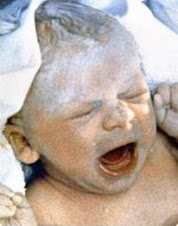IMMUNE TREATMENT ‘CUTS IVF FAILURES’
Suppressing the immune systems of women who suffer recurrent miscarriage may be able to allow many more to give birth.
The technique may also help those who suffer repeated IVF failures, or who cannot get pregnant, without an obvious reason why.
A leading US expert is presenting the results of his first, small scale study into a therapy at a UK conference on Monday, and these suggest it could be a highly successful approach - even among older patients.
Many thousands of women have unexplained infertility, suffer recurrent miscarriages, or cannot succeed with IVF, despite their young age and apparently good health.
Professor Alan Beer from Chicago Medical School, says that, in some cases, the problem may be an immune system which turns on the newly-implanted embryo and destroys it.
Although the father's genetic material is present in the embryo and on the surface of the placenta, the mother's body does not reject it.
However, in some cases, there is strong evidence that this process goes wrong.
Test and treat
He believes he has developed both a test for those women who are at risk - and a potential treatment to counter the problem.
Professor Beer concentrated on women who have suffered recurrent IVF failures, in which implanted fertilised embryos do not produce a successful pregnancy.
He found that seven out of ten women with three IVF failures had higher than normal levels of a chemical called tumour necrosis factor alpha (TNF alpha).
This is a product of a type of immune system cell called a natural killer cell, and is responsible for damage to tissues in "autoimmune" diseases such as lupus, rheumatoid arthritis and Crohn's disease.
Professor Beer's theory is that the immune system is also attacking the embryo in women with recurrent miscarriage, saying that the body was treating the embryo "like a cancer".
Existing drugs
There are existing medications used to reduce levels of TNF alpha in the body - but these are currently only licensed to treat established auto-immune disorders.
In trials involving 100 patient who had all suffered repeated IVF failures, he found that 78% of those under 35 years old managed to become pregnant.
Even a significant proportion of those aged 40 and above managed to get pregnant this way.
The treatment has so far produced 80 live births.
Professor Beer said: "It's like when you find the correct area code and you connect the telephone call - these healthily infertile women proved to me that their bodies were made to have babies.
"The breakthrough was to find what component of the immune system was doing the killing - and then reduce that component to normal levels."
'Astonishing'
Dr Simon Thornton, from Nottingham's Care in the Park clinic, said: "A third of our patients have an unexplained infertility.
"Professor Beer suggests that an abnormally active immune system is blocking pregnancy or acting to stop it from developing.
He has shown astonishing success rates in patients who would have otherwise had very very low success rates.
"At present, we use IVF as a treatment for many patients who have unexplained infertility - but this may be a much more straightforward treatment to allow them to have a perfectly successful pregnancy."
Dr Mohammed Taranissi, from the Assisted Reproduction and Gynaecology Centre, told the BBC that the results, although small-scale, were "impressive".
He said: "It's something we have suspected for a long time.
"Now we have to see whether we can apply a drug which has been developed for another problem for infertility problems."
SOURCE: BBC NEWS
Sunday, December 30, 2007
Subscribe to:
Post Comments (Atom)
| Powered By widgetmate.com | Sponsored By Digital Camera |







2 comments:
Post a Comment